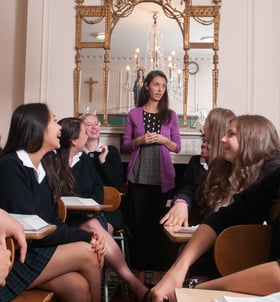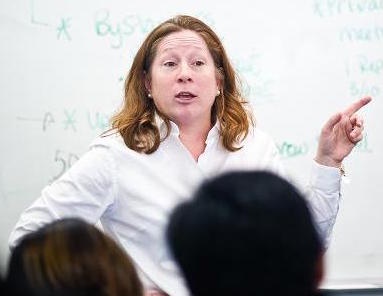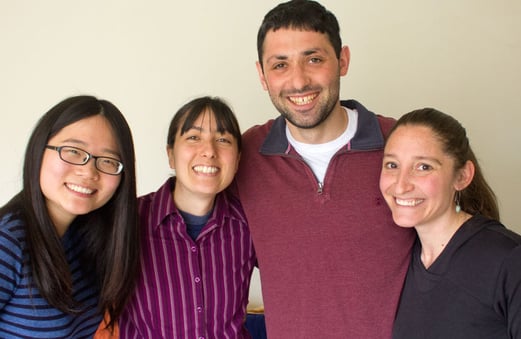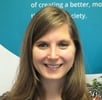Make sure to sign up for Face the Future and stay tuned to hear the themes for the 2017 MSS Innovation Awards! In the meantime, take a look back at three previous award winners for inspiration!
 Katie Leo, Chairperson of the Theology Department
Katie Leo, Chairperson of the Theology Department
Project: The Civil Rights Movement: Then and Now
School: Dominican Academy in New York City
Location: New York City
Year: 2015
About the project: A longtime Facing History teacher, Katie Leo had taught multiple Facing History units. When she heard about the MSS Award from her program associate, she thought it was a great way to bring a full Facing History class to her students while combining it with experiential learning. The award allowed her to create that class, “The Civil Rights Movement: Then and Now,” which incorporated Facing History’s Race and Membership lessons with a trip to the National Center for Civil and Human Rights in Atlanta, Georgia. The class allows her students to examine the consequences of dividing people by race while visiting historical places in the Civil Rights Movement so they can make connections to current events surrounding race in today’s world. The start of this school year marks the second year of the course, which has doubled the number of students taking it. Katie also plans on taking students to Atlanta again to continue the experiential learning aspect.
What was the biggest transformation you saw in yourself and in your students?
Teaching this course helped me identify areas where I needed help, particularly in supporting students to navigate difficult conversations. Although I felt comfortable discussing race and racism, I realized quickly my students weren't as comfortable. Facing History and my program associate helped me discover creative ways to create this safe space so they could have productive and respectful dialogue.
In class we tried to understand what it might have felt like to take part in the Civil Rights but it wasn't until we arrived in Atlanta that the brutality the upstanders of this era faced was clear. The National Center for Civil and Human Rights has a simulated lunch counter experience where you can hear and feel what people in Greensboro might have experienced during a sit-in. A number of my students were brought to tears -- students who I might not have expected to react in this manner. This experience made something real for them. It highlighted that fighting for racial justice was not easy or without risk, just as it remains challenging today. It got us thinking: if so many risked so much, don't we owe it to those who came before us to continue the struggle, no matter the cost?
 Merri Weir, Former History/Social Science Teacher at Carson High School
Merri Weir, Former History/Social Science Teacher at Carson High School
Project: House on Mango Street School-wide Community Building Read
School: Carson Healthy & Medical Partnership Small Learning Community (CHAMPS) at Carson High School (now Academy of Medical Arts at Carson Complex Pilot school)
Location: Carson, CA
Year: 2008
About the project: Merri and her colleagues observed how much students enjoyed reading and team building projects. They also knew that other schools were doing school-wide reads - where an entire school reads a book together, reaching across all different grades. Merri wanted to make this happen at her school. Using the book, The House on Mango Street by Sandra Cisneros, she used the funds from the MSS award to purchase supplies and copies of the book to get the school-wide read started. Teachers were given the opportunity to implement the project in their own independent way but had to draw from themes, readings, and strategies from Facing History’s units, Holocaust and Human Behavior and Race and Membership. Students would then participate in a gallery walk featuring their projects to create a shared conversation that connected House on Mango Street with the various communities the students belonged to.
How did this project affect teachers and students?
We did not want this to be just another assignment but one that built school culture and developed a community while also allowing teachers to maintain their autonomy when implementing the project. Attempting this school-wide read allowed me and the other teachers to reflect on what worked and what didn’t and allowed us to create guidelines that are still used today. I also used the experience to strengthen our summer reading assignments and our team building projects that we do during the first week of school. We would watch students from all different grades carrying the same book and talking with each other about it outside of class. They were all so engaged. They even asked when the next school-wide read would be!

Lucy Rowell, Freelance Documentarian
Sasha Endo, English as a Second Language Teacher, Ithaca Adult ESL program
David Rhodes, 8th Grade Social Studies Teacher, The Alternative School For Math and Science, Ithaca, NY
Jeni Rhodes, Substitute Teacher, Ithaca City School District, Ithaca, NY
Project: Transformative Voices Speaker Network
Location: Ithaca, NY
Year: 2015
About the project: David, Jeni, Lucy, and Sasha recognized the powerful impact guest speakers can have on students. They decided to create a network that connects educators in Ithaca, NY with local guest speakers whose stories have the potential to inspire young people, bridge divides, and expand students’ concepts of their universe of obligation. First, the team identifies and reaches out to potential guest speakers to explore their stories and to consider the connections with choices people make to be upstanders, bystanders, and perpetrators. Then, they connect teachers with speakers whose stories align with particular themes or lessons.
How has this project impacted your teaching?
This award has changed my teaching by highlighting the reality that our teachers are all around us. In the specific context of school, the “teachers” include the students and speakers who visit my classes, and, oftentimes it is in the exchanges between speakers and students where some of the most powerful learning happens. The ideas that students share and the questions they raise bring out deep aspects of their own perspectives while illuminating ideas and experiences in the stories of the speakers.
This project has also raised my awareness of the role I can play in the broader community. Just as I can facilitate the interactions between speakers and students in my classroom, I can help those same connections happen elsewhere. I believe this project can impact local schools and the broader community inside and outside of the classroom through speaking engagements, events, panel discussions, and community conversations. The possibilities are endless. There are stories waiting to be told, stories waiting to be discovered, and audiences ready to engage. We just need to make the connections. -- David Rhodes
We hope these three examples of classroom innovation inspired you! Make sure to sign up for our online game for social change, Face the Future, to get even more inspiration for the upcoming 2017 Margot Stern Strom Innovation Awards. Stay tuned for more information!

